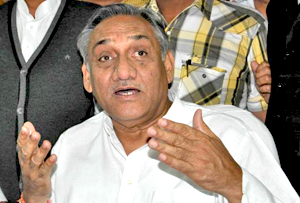 Dehradun, Jun 30: The exact number of people dead or washed away may never be known, Uttarakhand Chief Minister Vijay Bahuguna said today as estimates of casualties in the worst natural disaster in the state run from several hundreds to several thousands.
Dehradun, Jun 30: The exact number of people dead or washed away may never be known, Uttarakhand Chief Minister Vijay Bahuguna said today as estimates of casualties in the worst natural disaster in the state run from several hundreds to several thousands.
"We will never know the exact number of those dead and the number of people who have been buried or washed away," he said in an interview.
State Assembly Speaker Govind Singh Kunjwal had stated yesterday that the number of those killed could breach the 10,000 mark but the Chief Minister had said the figure was incorrect.
"There are 500-600 bodies which are visible, not only in Kedarnath area, but also in the entire state," he said as Uttarakhand makes a difficult limp back to normalcy from the tragedy.
Bahuguna said as far as people from the state who are missing are concerned the district authorities will work on that. "For the victims of my state we will give the compensation and put them on fast track."
As for those who are from other states they should lodge complaints in their state, he said.
"If the states confirm to Uttarakhand that people from their states had come on pilgrimage here and that these number of pilgrims should be presumed to be dead and have not come back, we will accept their version and the compensation amount will be paid to respective chief secretaries for distribution to victims of the respective states," he said.
"There is a DIG rank officer (Mr. Gunjiyal) who is up there in Kedarnath and has been assigned the task of cremation of bodies. The process of cremation is on.
"The bodies which were lying on the streets (have been taken for cremation). A number of bodies are stuck in the buildings where they were living but for them (to be extricated) you require some machines. Some JCB machines are being made available," Bahuguna said.
Bahuguna said the Air Force and PWD were deciding on the design and make of JCBs which will be carried on choppers to these places.
"Bodies which are in Rambada no one can reach (them) but the question is what do we do to them so that the environment is not polluted. Some chemicals and powder have to be used."
Asked about the criticism over the response to the disaster, he said the response from the Army and the government was very prompt.
"There was no delay. Only because of bad weather and connectivity problem it took time for them to reach. But when they reached and the very fact that thousands were evacuated and in the last so many days more than a lakh people were evacuated without there being a law and order problem, the credit should go to the state government that there was no law and order problem."
He said there were more than 200 villages where there is no connectivity and these have to be rehabilitated. A survey is being conducted for this and experts will be consulted.
"Food will be sent to these villages. Work is in progress. We are dropping food so that these villages can sustain themselves for two months. Relief material is being parked at the district headquarters."
The Chief Minister said in a week's time mule paths will be made in all the locations so there can be some connectivity.
"No village will be left out where relief will not reach. That is our priority. It will take time as you cannot make metalled roads during monsoons.
"I don't agree with this that it is a man-made disaster. Calamities are not in our control. I cannot control tsunami, earthquake or cloudburst. What can I do in such a scenario is how can I save my people. Calamities are not under our control...what can be the plan, we can do scientifically (is being done)."





Comments
Add new comment